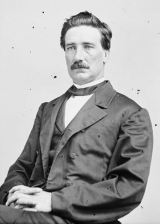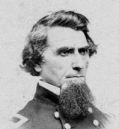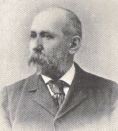About the time folks were talking about Bristoe Station, last month, other things were happening on the Sesqui calendar of events. It just so happens I’m a little late in marking the dates.
On October 18, 1863, for example (as a Sesqui reflection of “meanwhile, here in the Shenandoah Valley…”), John D. Imboden’s command closed-in on Charles Town, (West) Virginia and bagged many of the members of the 9th Maryland Infantry. It’s minor in comparison to events at Bristoe, but I’m rather interested in the “why” and “how” about the 9th Maryland at Charles Town.
In the latter part of August, 1863, Lt. Col. Benjamin Simpson, commanding the 9th Maryland, was ordered to move his regiment from Loudoun Heights to the woods on the east side of Charles Town. It wasn’t important for Simpson to “hold” Charles Town, but rather to use that position to more effectively monitor Confederate activities.
His instructions from his brigade commander were that the holding of Charlestown itself was of no more importance than as though it was an open plain, but to be vigilant in scouting the country, watching the movements of the enemy in his front, to engage and whip any force that came within his reach that was not too strong for him, and if attacked by superior numbers to retire. From about the middle of September there appears to have been a force of rebels in that vicinity, which for some time were believed to be small, under the command of Major White. About the 1st of October it was rumored that an advance of a part of Lee’s army in that direction might be expected, and that unusual vigilance was necessary. On the 7th of October he was informed by Colonel Wells, commanding brigade, that Imboden was said to be preparing to make a said on the railroad between Martinsburg and Harper’s Ferry.
I wrote about one encounter, during Simpson’s stay at Charles Town, a few months ago.
As for October 18, several excused Simpson for what might otherwise be considered poor ability as a commander. A court of inquiry (convened in December, 1863) stated specifically:
… the surprise and capture of the greater part of the forces under the command of Colonel Benjamin L. Simpson, Ninth Maryland Infantry, at Charlestown, Va., on the morning of the 18th day of October ultimo, were inevitable, because of the peculiar location of the place, which, surrounded by an open country for several miles on all sides, and approachable by a large number of roads from all directions, was easy to be flanked and surrounded, and because of the superior force by which it was attacked and of the inferior force for its defense. The rebel attacking force was 2,000 men, with six pieces of artillery. The defending force, under the command of Colonel Simpson, consisted of 375 infantry and 75 or 80 cavalry.
There are others, however, who put the blame on Simpson’s inexperience as a commander… but I don’t think that holds weight.
Granted, by occupation, he was actually a ship joiner… and in his mid-40s. That said, he was also a prewar officer of militia… for whatever experience that might have provided him (which likely wasn’t a great deal, even though he was in the militia nearly a decade before the war). Prior to his command of the 9th Maryland, Simpson had served (1861-1862) in Purnell’s Legion Maryland Infantry… first as a captain of Company A, and later (April, 1862) as major, and lieutenant colonel (July). Though he resigned in December, 1862, he secured the position of lieutenant colonel with the 9th Maryland Infantry (a 6- month regiment called into service to help “repel” the invasion of Maryland and Pennsylvania), on June 29, 1863. Simpson’s regiment did not really assist in “repelling” Robert E. Lee, but, rather, was used to guard portions of the B&O Railroad in Jefferson County. While companies A, B. & C were detailed to different positions in the county, companies D, E, F, G, H, and I were those present at Charles Town, on October 18.
So, even though Simpson was “let off the hook”, there were others who weren’t so understanding. Gen. B.F. Kelley was among those, stating…
After a careful perusal of the testimony adduced, I cannot concur in the opinion expressed by the Court that no blame can justly be attached to Colonel Simpson on account of the surprise and capture of Charlestown, or that the capture was inevitable. I am of the opinion that Colonel Simpson was derelict in suffering his command to be surprised, and that he could and should have maintained himself in his position until he could have been relieved by the forces at Harper’s Ferry, which were started to his assistance as soon as the cannonading of the enemy was heard at that place. I therefore respectfully recommend that Colonel Benjamin L. Simpson, Ninth Maryland Volunteer Infantry, be dismissed from the service of the United States.
One Hundred and Fifty years after the fact, I have to agree with Kelley.
I think the court of inquiry was correct… that Simpson’s regiment was in a rather difficult position to counter Imboden’s attack… but that’s not to say Simpson had to hold it (again, see the orders to Simpson at the beginning of this post). In fact, the court of inquiry acknowledged the fact that Simpson had received warning of Imboden’s build-up.
On the 17th Colonel Simpson informed Colonel Wells that a detachment of cavalry came into Charlestown the night before, being unable to reach Berryville on account of White’s occupation of it. That an officer of Cole’s battalion had arrived, having been wounded in a skirmish, and that he represented that no other force was in the valley but Imboden’s; and further that he had captured one of White’s men, who informed him that White’s battalion, consisting of 150 cavalry and 80 dismounted as infantry, had been at Berryville, had reconnoitered the position at Charlestown, and had found it too strong for them; and that White had moved away, and Imboden was 8 miles above Winchester with 800 men.
From this, it might be suggested that Simpson had no reason to be concerned.
There is, however, another quote that comes from one of the men who was with a detachment from Cole’s Cavalry, which had been sent on a scouting mission to Berryville… and, whether it was hindsight or not (written years after the incident and the war), the trooper (C. Armour Newcomer) presented the following details:
Major Cole, with the Battalion, did not arrive at Charlestown until late in the evening, and then proceeded to camp, at Harper’s Ferry. Major Cole insisted upon Colonel Simpson, commanding the 9th Maryland Regiment, to vacate Charlestown and fall back with his Regiment several miles on the Harper’s Ferry road as soon as night approached; Cole telling him he would have a better chance to handle his men, instead of having them cooped up in the Court House, a position they were then occupying. Simpson refused to accept the Major’s suggestions, saying he would not leave his post until driven out. Major Cole advised that in the event of an attack he (Simpson) should take possession of the houses on both sides of the street, as the enemy would, not shell the town and relief could come from Harper’s Ferry, Simpson replied he could take care of himself if the enemy came down upon him. Major Cole reported to General Sullivan the true state of affairs, on his arrival at headquarters. General Sullivan did not send reinforcements to Colonel Simpson…
Should Simpson have been more concerned?
Newcomer assessed the situation thus…
Had Colonel Simpson taken the advice of Captain Gallagher and Major Cole, the 9th Maryland would never have been taken prisoners and many lives saved, as they were confined at Andersonville for more than a year; when the time came for the members of the 9th Regiment to be exchanged, not one-third were living to return to their homes.
Whether or not one agrees that Simpson’s story was a reflection of “folly”, I think few will dispute the daring exhibited in the story of the scouting party that made possible the report to Simpson. That story, coming up next.





Mike Musick
November 24, 2013
For additional details, see “‘They Are Coming!’: Testimony at the Court of Inquiry on Imboden’s Capture of Charles Town,” in “Jefferson County Historical Magazine,” LIV, Dec. 1988, Paul E. Barr, Jr., and Michael P. Musick, eds.
Robert Moore
November 25, 2013
Thanks, Mike.